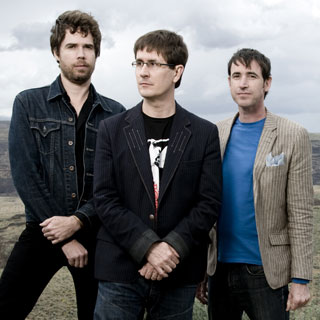John Darnielle has always, always had a gifted relationship with words. However, his preferred medium—song—requires said words to be sung in addition to written. “My voice,†Darnielle admits, “is a take-it-or-leave-it proposition. And I realize many people would like to leave it.â€
By himself at times, and with accompaniment at others, Darnielle has been compulsively releasing music as The Mountain Goats for coming up on 20 years now. (Since 2007, the band has included off-and-on bassist Peter Hughes as well as drummer extraordinaire Jon Wurster.) The band began garnering high regard in the late ’90s, first from acolytes who avidly collected Darnielle’s scrappily recorded cassette releases, and later from critics who admired his downright writerly grip on language. Both the former and the latter have rightfully hailed The Mountain Goats for a particular quality that has been consistent from their lo-fi roots to their currently clean folk-pop presentation: conviction.
Darnielle’s vocals seem to channel directly from a tense throat to a vice-like clenched jaw. On beloved moments from The Mountain Goats’ catalog—“The Best Ever Death Metal Band in Denton†and “Going to Georgiaâ€â€”the gravity is immediately evident in Darnielle’s voice. Although he had intensity for days, he eventually began to notice other important elements might have been lacking. Darnielle credits two people with helping to navigate this potential issue. This first was close to home: his wife.
“She’s sort of hands-off with critiquing my stuff, but starting three or four years ago, I’d say, ‘What do you think?’ and… I had noticed that she just didn’t seem that impressed,†says Darnielle. “[She said], ‘You need to sort of reach out melodically a little more,’ so I really did focus, thinking about melodies and listening to songs for how melodies work.â€
The second person to help Darnielle build on his talents as a vocalist was producer Scott Solter (Pattern Is Movement, Venice Is Sinking). “He talked to me about how my phrasing is something that I may not know that I sort of have,†says Darnielle. “Default rhythm and a default melody—not the same melody, but some melodic tendencies that you can break out of if you stop to think about it. So, yeah, I was really focused on this record to try to make the melodies snap a little more. I’m kind of doing the same thing with the new ones, but I’m trying to remain in the sevenths and ninths some more. I’m more prone to be strictly standard major chords and power chords, but I’ve been trying to reach into more melancholy spaces.â€
In addition to deftly exploring his own music, Darnielle is also known for his equally exploratory writing about other people’s music, in the forms of both prose and, occasionally, poetry. Most recently, one can find bite-sized asides of black metal-inspired verse on his website: Last Plane to Jakarta. Scanning through the writing on this site (or flipping through it in its early print zine format, if you’re lucky), one notes that Darnielle can authentically discuss the merits of Slayer and the Geto Boys. When asked what ties together his disparate interests, Darnielle simultaneously answers and rejects the question.
“The common thread is that it’s all music of expression,†he says. “I think once you looked at music from a certain angle and stopped thinking about whether you were the type of people who make that kind of music or not, when you listen to everything as an expression of an active, creative mind, then genre distinctions fall away. The common thread is pretty basic; the stuff I listen to all involves people focusing on trying to express something a little out of the way. Something a little underrepresented in general. But I don’t think genre is actually real. I think those distinctions are more cosmetic than actual.â€
Fans of Darnielle’s writing—as well as his voice-from-the-sidelines tone—are probably already hip to his fictionalized book espousing the greatness of Black Sabbath’s Masters of Reality, but will be pleased to know he’s been working on a second book. But music, he says, remains at the forefront of his mind for two reasons, one of which relates once again to the familial priority.
“Music, it’s more of my abiding daily passion, has been for a long, long time, and it’s my actual job, right?†he says. “So, when I’m writing a book, I hope it does well and everything, but I’m not relying on that to provide for my family. Whereas music, beyond being a passion for me, it’s also how I put food in my son’s mouth. So, I’d write more books if I thought I could make a living off it, but that’d be pretty risky, since I’m a married guy. And quitting a job to buy a typewriter has never been my style.â€
WHO: The Mountain Goats, Nurses
WHERE: 40 Watt Club
WHEN: Monday, Jan. 30, 8 p.m.
HOW MUCH: $16 (adv.)
Like what you just read? Support Flagpole by making a donation today. Every dollar you give helps fund our ongoing mission to provide Athens with quality, independent journalism.










